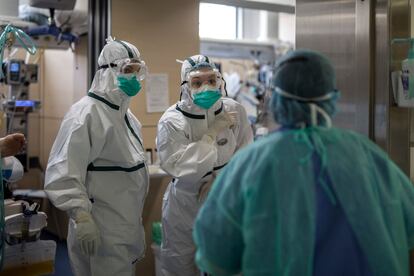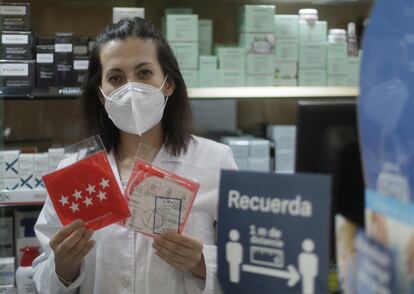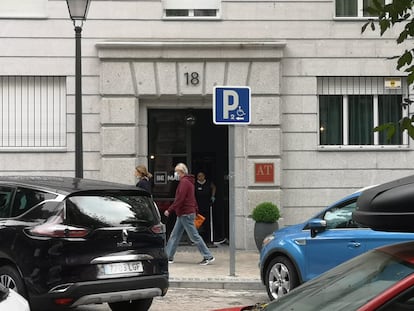Spain records rise in daily coronavirus deaths: 217 in the past 24 hours
This is the first time in five days that the country has reported more than 200 fatalities. A spike in new infections was also detected, with 506 cases confirmed since Wednesday

The Spanish Health Ministry reported on Wednesday a rise in the number of daily coronavirus-related deaths, with 217 victims recorded in the past 24 hours, compared to 184 on Wednesday. This is the first time in five days that the number of daily fatalities has exceeded 200. The figure was 176 on Tuesday, 123 on Monday, and 143 on Sunday. The total number of victims in Spain now stands at 27,321.
Fernando Simón, the director of the Health Ministry’s Coordination Center for Health Alerts and Emergencies, said on Thursday that some regions had reported coronavirus fatalities that did not occur within the last 24 hours. Although the health expert did not specify which region, Catalonia recorded 123 coronavirus deaths on Thursday, or 60% of the daily figure, compared to 66 and 71 reported on the previous two days.
In the past 24 hours, 506 new coronavirus cases were detected, as confirmed by PCR tests, bringing the total to 229,540. This represents a rise of 0.22% from the day before, when there were 439 new infections. The total number of cases represents 0.4% of the Spanish population. But according to the preliminary results of an antibody study from the Carlos III Institute, which were announced on Wednesday, 5% of Spaniards have at some point contracted the coronavirus – the equivalent of 2,350,000 people.
Speaking at the government’s daily conference on Thursday, Simón explained that the “increase in [new] infections is proportional in all age groups,” meaning that the decision to allow children outside for supervised walks “does not appear to have had an effect” on the evolution of the outbreak.
According to the latest figures, the number of daily hospital admissions for coronavirus fell to 330, from 412 on Wednesday. Since the beginning of the pandemic, 143,374 coronavirus patients have been discharged from hospital after recovering from the disease – 2,551 in the past 24 hours. This represents a rise of 0.27% of the day before.
More than 50,000 health workers in Spain have contracted the disease since the beginning of the crisis.
The regions of the Asturias and Cantabria reported no new cases on Thursday, while the Balearic Islands, the Canary Islands, Cantabria, Extremadura, Murcia, Navarre and La Rioja reported fewer than 10. Since Wednesday, 29 coronavirus patients were admitted into intensive care, almost all of these cases (23) were recorded in the regions of Madrid and Catalonia.
Problems with face masks in Madrid
The face masks that the Madrid regional government has been distributing for free this week do not meet European Union regulations, according to the Business Association of Personal Protective Equipment (Asepal). In a press release on Sunday, Madrid premier Isabel Díaz Ayuso stated that the regional government had purchased 14 million FFP2 masks for €32 million, which “met all European Union regulations.”

According to this statement, the masks are “reusable” and can be used for up to “48 hours straight.” But there is nothing to certify any of this information, not even that the masks belong to the FFP2 category. The packaging of the products has the CE sign, which indicates that the products comply with EU regulations regarding masks. But as the website Maldita.es revealed, this certification is false. The manufacturer of the masks, Wenzhou Haoshuo Home Textile, has deleted its official page from the site Alibaba, which is the largest e-commerce site in the world.
The masks, which have been handed out for free at pharmacies to people with a Madrid health card, do not contain any cleaning or disinfecting instructions. Nor is there information about what levels of protection are appropriate for different risk groups, where they were manufactured, what type of protection they provide or even the “R” symbol to indicate that they are reusable.
What’s more, the masks are not appropriate for children under the age of four. On Wednesday, pediatric primary healthcare coordinators asked pharmacies to “immediately” stop handing them out to infants.
Scandal over Madrid premier’s luxury apartment deepens
More questions have been raised about the luxury apartment of Madrid premier Isabel Díaz Ayuso. In mid-March, the Popular Party (PP) politician moved into the upscale Be Mate Plaza de España hotel, which belongs to the Room Mate chain, allegedly to go into quarantine after testing positive for Covid-19. But a press release from Room Mate indicated on Tuesday that Díaz Ayuso had signed an agreement with the company “before the state of alarm,” which was declared before the premier tested positive for the virus.

It has now been revealed that the Madrid premier has in fact two luxury apartments in the hotel – a Royal Suite and a second apartment on a lower floor. For these two rooms, Díaz Ayuso will be charged just €80 a night, or €2,400 a month, as part of “package” price, according to the owner of Room Mate Kike Sarasola.
On Wednesday, Sarasola told Spanish television Antena 3 that such discounts were available to anyone who wished to stay at a Room Mate hotel. But while the premier enjoys a 60% discount for a long-term stay, other visitors do not benefit from these same favorable prices. With a 60% discount, a Deluxe Suite, for example, should cost €1,200 for 30 days, but the hotel webpage charges €3,568.
Opposition parties have highlighted that top officials in the Madrid regional government are prohibited from accepting “gifts or benefits” that could condition their actions in office.
Díaz Ayuso responded to the growing criticism on Thursday, arguing: “ Do you think I can resolve the issues of Madrileños from the dining room where I eat every day?”
“While I am working as the premier of Madrid, I will do so in a site with flags, in a dignified site with, for example, a photo of the King,” she added, in reference of King Felipe VI of Spain.
Protest against Spanish prime minister
Dozens of people on Wednesday broke the coronavirus confinement measures to march in the street to demand the resignation of Spanish Prime Minister Pedro Sánchez. This was the fourth day in a row that residents have gathered in Madrid’s wealthy Salamanca neighborhood to demand the Socialist Party (PSOE) leader resign over his handling of the coronavirus crisis. The protest was sparked on Sunday when dozens of neighbors gathered outside an apartment that was playing loud music from the balcony. On that occasion, 12 people were fined for breaking the lockdown rules of the state of alarm.
The protesters on Wednesday wore masks, but did not respect social distancing rules. Instead, they gathered in groups to block traffic from entering the street. Many carried Spanish flags, some of them from the eagle-emblazoned pre-constitutional Spanish flag. At 8.30pm, residents of the neighborhood – which voted overwhelmingly for the Popular Party and the far-right Vox at last year’s national election, began to bang pots and pans and hit traffic lights and trash cans.
With reporting by Isabel Valdés and Fernando Peinado.
English version by Melissa Kitson.
Tu suscripción se está usando en otro dispositivo
¿Quieres añadir otro usuario a tu suscripción?
Si continúas leyendo en este dispositivo, no se podrá leer en el otro.
FlechaTu suscripción se está usando en otro dispositivo y solo puedes acceder a EL PAÍS desde un dispositivo a la vez.
Si quieres compartir tu cuenta, cambia tu suscripción a la modalidad Premium, así podrás añadir otro usuario. Cada uno accederá con su propia cuenta de email, lo que os permitirá personalizar vuestra experiencia en EL PAÍS.
¿Tienes una suscripción de empresa? Accede aquí para contratar más cuentas.
En el caso de no saber quién está usando tu cuenta, te recomendamos cambiar tu contraseña aquí.
Si decides continuar compartiendo tu cuenta, este mensaje se mostrará en tu dispositivo y en el de la otra persona que está usando tu cuenta de forma indefinida, afectando a tu experiencia de lectura. Puedes consultar aquí los términos y condiciones de la suscripción digital.








































